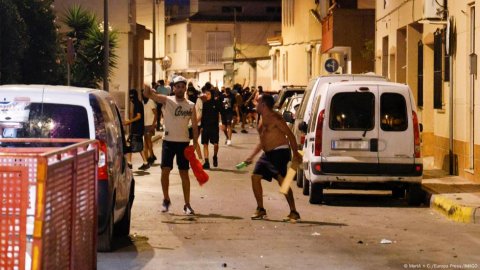Understanding Anti-Migrant Violence in Spain
In recent years, Spain has witnessed an alarming rise in anti-migrant violence, with a significant incident occurring recently where five individuals were injured. This spate of violence has been largely attributed to tensions stirred by far-right groups, which have gained traction across Europe. As we delve into the complexities of this issue, it is crucial to understand the broader context of immigration policies and the socio-political landscape in Spain.
The Rise of Anti-Migrant Sentiment
The recent violent outbreak reflects a growing sentiment against immigrants within Spanish society. Many far-right organizations have exploited economic uncertainties and social fears to promote a narrative that portrays migrants as threats to national identity and security. This narrative has contributed to an environment where violence against migrants is increasingly normalized.
- Social Media Influence: The role of social media cannot be overlooked, as it has been instrumental in spreading anti-immigrant propaganda.
- Political Exploitation: Political parties often harness these sentiments for electoral gains, which further exacerbates tensions.
- Public Perception: A significant portion of the population holds negative views towards migrants, influenced by media portrayals and political rhetoric.
Impact of Recent Violence
The violence that injured five individuals serves as a stark reminder of the potential consequences of unchecked hate speech and xenophobia. This incident has not only raised concerns about the safety of migrants but has also highlighted the urgent need for effective immigration reform and policies that promote social cohesion.
Key impacts include:
- Increased Fear Among Migrants: Such incidents create an atmosphere of fear and uncertainty within migrant communities, affecting their mental health and overall well-being.
- Community Division: The rise in violence can lead to a greater divide between native citizens and immigrant communities, fostering an environment of mistrust.
- Calls for Action: Human rights organizations and advocacy groups are urging the government to take a stronger stance against hate groups and implement protective measures for vulnerable populations.
Government Response
In light of the ongoing violence, the Spanish government faces increasing pressure to address the root causes of anti-migrant sentiments. This involves not only enforcing laws against hate crimes but also implementing comprehensive immigration reforms that address the concerns of both migrants and native citizens.
Proposed actions include:
- Education Campaigns: Initiatives aimed at fostering understanding and acceptance of immigrant communities can help mitigate hostility.
- Stronger Law Enforcement: Ensuring that law enforcement agencies are equipped to respond effectively to hate crimes and protect vulnerable populations is vital.
- Engagement with Communities: Encouraging dialogue between migrants and local communities can help bridge gaps and build trust.
The Role of Immigration Policy
Spain’s immigration policies must evolve to reflect the realities of a globalized world. The current approach often falls short in addressing the complexities of human migration, which can lead to resentment and conflict.
Key considerations for immigration reform include:
- Humanitarian Parole Programs: Expanding programs that allow vulnerable migrants to enter and stay in the country legally can reduce the number of undocumented individuals and subsequent tensions.
- Streamlined Processes: Improving the efficiency and transparency of immigration processes can enhance the experience for newcomers and foster a sense of belonging.
- Support for Integration: Providing resources for language and job training helps migrants assimilate, contributing positively to society.
The Bigger Picture: European Context
Spain’s situation is not isolated; it reflects a broader trend across Europe, where far-right groups are gaining momentum and anti-immigrant sentiments are on the rise. Countries such as Italy and Hungary have also experienced similar issues, leading to violent outbursts against immigrants.
Factors influencing this trend include:
- Economic Strains: The economic fallout from the pandemic has intensified anxieties about job security, leading to scapegoating of immigrant populations.
- Political Climate: The rise of populist leaders who advocate for stricter immigration controls has emboldened extremist groups.
- International Conflicts: Ongoing conflicts in regions like Cuba, Nicaragua, and Venezuela have resulted in increased migration, which can further inflame tensions in host countries.
Moving Forward
To combat the rising tide of anti-migrant violence, a multi-faceted approach is necessary. This includes not only stronger legal frameworks and enforcement but also community engagement and education. In addition, addressing the root causes of migration through international cooperation can help create a more stable global environment.
As Spain and other European nations navigate this complex landscape, the importance of compassion, understanding, and effective immigration policies cannot be overstated. By working towards a more inclusive society, we can hope to diminish the factors that contribute to violence and foster a culture of respect for all individuals, regardless of their background.
In conclusion, the recent violence against migrants in Spain serves as a wake-up call for society to reflect on its values and take decisive action to ensure safety, dignity, and respect for all individuals. Only through collective efforts can we hope to make meaningful progress towards a more just and equitable future.










